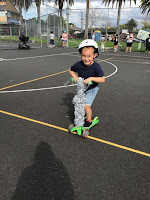E kore au e ngaro,
He kākano I ruia
Mai I Rangiātea
I will never be lost,
For I am a seed
Sown in the heavens
For
all of us, as individuals, groups and nation, our culture gives us strength and
direction, and as a teaching team and a learning centre it is important to
acknowledge and celebrate this fact within our collective way of being and our
curriculum at Mairtown Kindergarten.
Nicki Lisa Cole (2019), explains culture consists of the values, beliefs, systems of language,
communication, and practices that people share in common and that can be used
to define them as a collective. Culture also includes the material objects that
are common to that group or society.
As
was explained in our previous blog, we have experienced lots of changes and
transitions over the last year, and to a degree that is a constant process
within a kindergarten, as tamariki and kaiako join us, grow and develop and
then move on to pastures new. Throughout the process of change and renewal it
has always been really important to hold on to the identity and culture which
makes our kindergarten so special.
Our
centre philosophy is key to expressing our centre culture, and guiding our
decision making to ensure our curriculum and relationships remain authentic.
Each time the teaching team changes, we review the philosophy so that we know
it fits with us as individuals and collectively.
The
tikanga which have always been the central pou (supporting pillars) of our
cultural expression are Manaakitanga and Whanaungatanga. The Māori dictionary
defines these tikanga as…
Whanaungatanga
- relationship, kinship, sense of family
connection - a relationship through shared experiences and working together
which provides people with a sense of belonging.
Manaakitanga - hospitality, kindness, generosity,
support - the process of showing respect, generosity and care for others.
For
us, all learning begins from a place of nurturing, relationship and belonging;
and recognising all tamariki bring with them their own whānau culture,
knowledge and gifts which they then build on within their learning environment.
We seek to promote an excitement for learning within our learning community and
see play as the essential means by which tamariki explore and develop their
skills, strategies and existing knowledge (Mairtown Philosophy).
We also
love to celebrate special individual milestones, birthdays with our special
birthday ritual, and the time of leaving us to take the next step in learning
by adorning the tamaiti with our beautiful Kahupukuwhiwhi. These Mairtown
kindergarten rituals recognising the importance of these landmark events for
each tamaiti, and their own important place within our kindergarten whānau.


We
love to recognise the mana of Te Tiriti ō Waitangi in our rituals, routines and
curriculum provision. This document preserves the rights of Māori as tangata
whenua of Aotearoa, and also offers those who have come to settle here since
the signing of te Tiriti ō Waitangi, the ability to make this their home too
and a framework within which to live respectfully.
As
we express in our centre pepeha, we all come from ngā hau e whā (the four
winds) to gather and learn together in the beautiful spaces we share; the
kindergarten itself and our wonderful Mair Park, home of our Nature programme. Our
pepeha has become a way for us to come together and understand the context we
are each part of here – our geographical features, the peoples who have come
before us and ourselves as a group. This is an understanding which forms the
basis of our connections at kindergarten, and we are so proud to see the way
our tamariki show their ownership of our pepeha, standing together to sing the
words and do the actions which depict what they are describing.
Our Morena song, mihi mo te kai (which offers gratitude for the food we have been provided with and those who have prepared it), and our mihi mo te ngahere (our nature programme greeting to the environment we are entering for the morning), are examples of ways we share our bi-cultural expression on a daily basis.
We honour the potential which individual tamariki demonstrate within their ways of being, knowing and
doing at kindergarten, qualities which demonstrate the principles of Tika; doing the right thing,
Pono; being honest and truthful and Aroha; showing love and caring, with our
Tui award; as these Kaupapa all strengthen their leadership and learning
potential. We also celebrate our emerging leaders with our Rangitiratanga
award.
Sharing
kai is also something we value highly as part of our Mairtown culture; offering
us opportunities to come together as a group and get to know each other better,
building our sense of unity and sharing aspects of our individual cultural
knowledge. We love to learn about and celebrate the diversity of cultures
within our community, and it is always special to share in some way within
kindergarten, a special day or event which is of cultural importance to members
of our kindergarten whānau. Recently we enjoyed recognising two significant
annual events for our kindergarten whānau and nation, first Waitangi Day and
then the beginning of the Year of the Ox, during Chinese and Korean New Year.





As
a teaching team we are always learning, yet always have so much still to learn
every day. We are lucky to be on this special journey with so many wonderful
people around us at Mairtown kindergarten, and we love the rich cultural
knowledge that each tamaiti and whānau brings with them to strengthen our
shared culture. Learning and growing together will surely support our tamariki to
grow up strong in identity, language and culture, able to engage with new
contexts, opportunities and challenges with optimism and resourcefulness (Te
Whāriki, 2017).
Tangata ako ana i
To kāinga, te tūranga ki
Te marae, tau ana
A person nurtured in the
community contributes
strongly to society
Ma te wā
Anne



















































